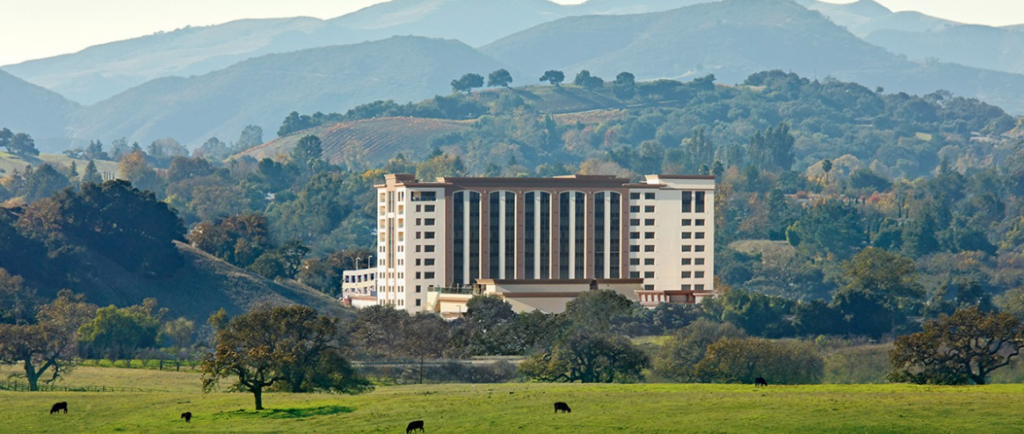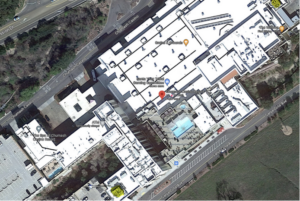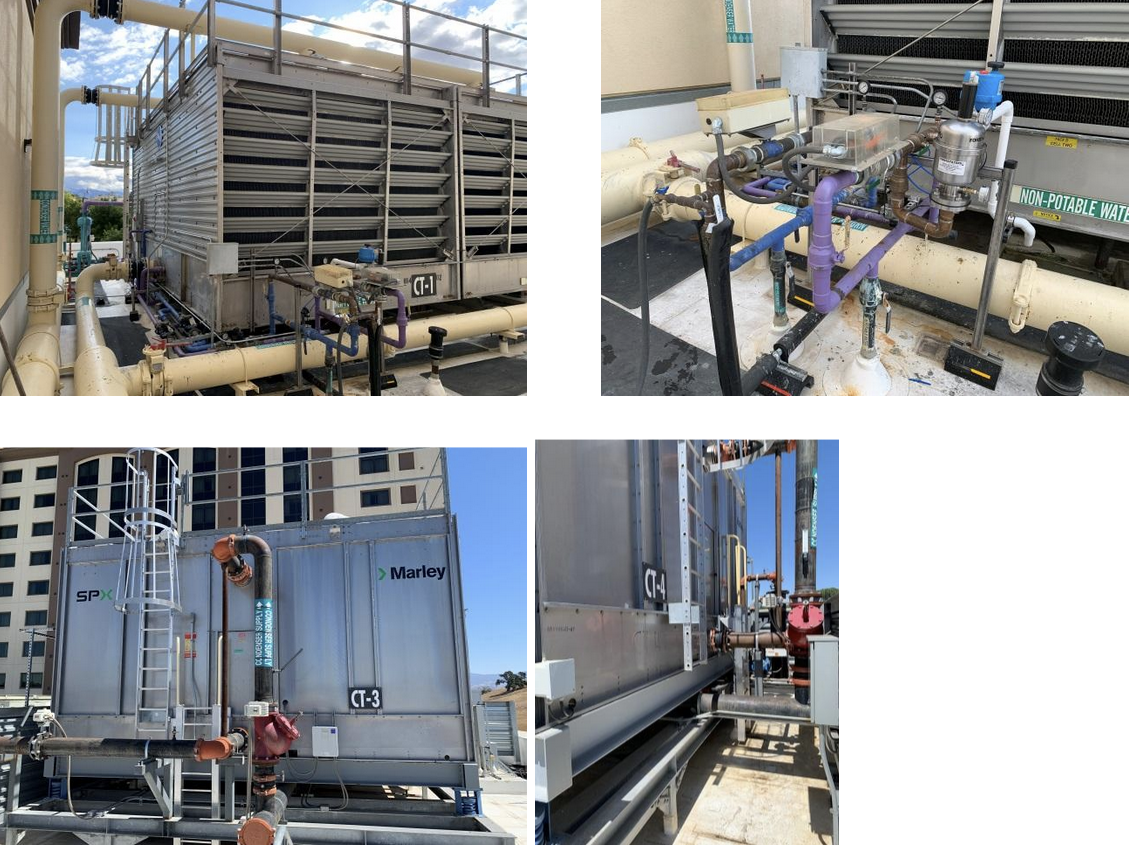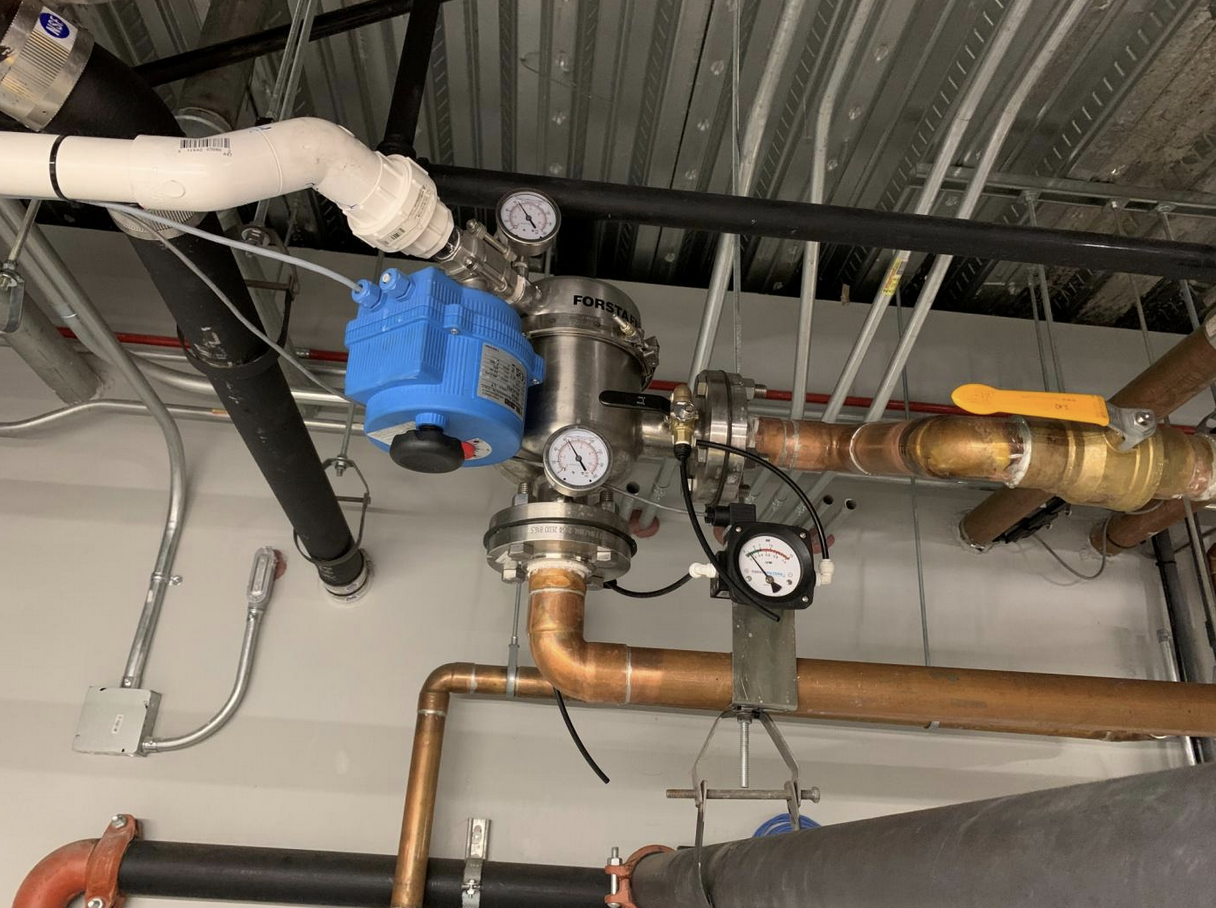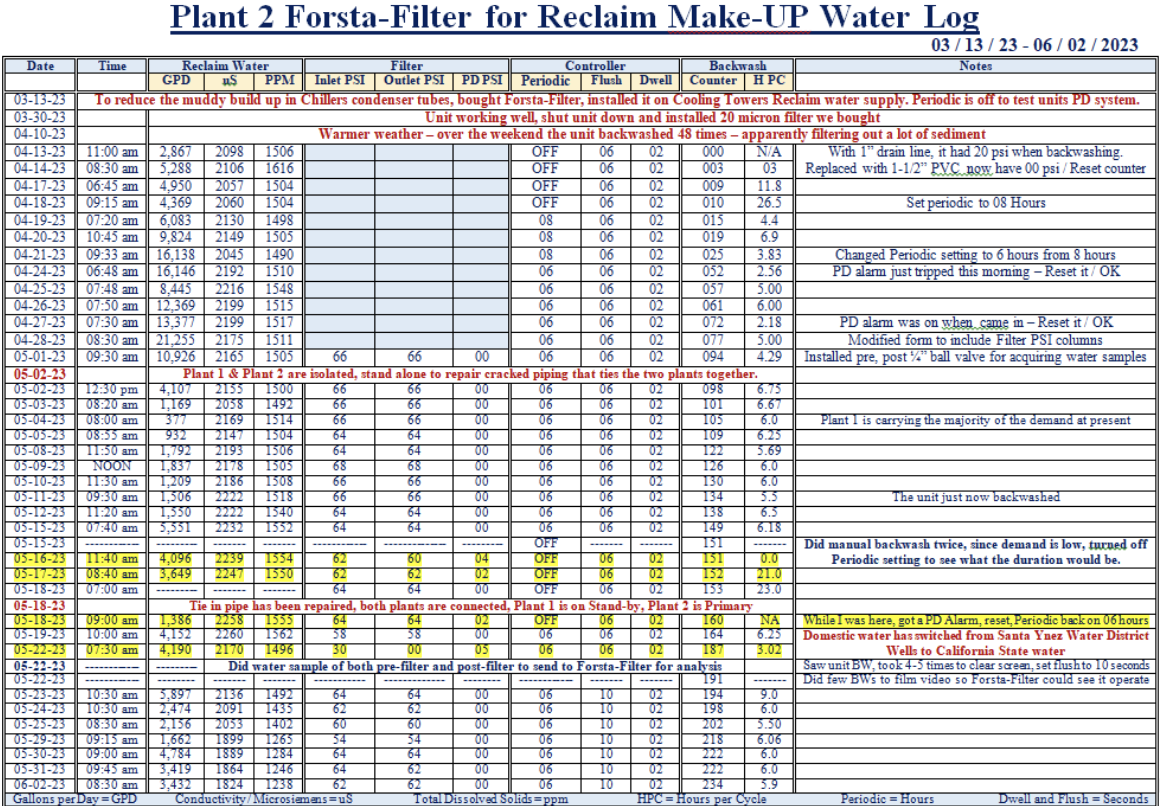HVAC Cooling Towers – Chumash Casino Resort
Enhancing HVAC Efficiency with Self-Cleaning Water Filters
Abstract: Cooling towers play a crucial role in many industrial and commercial HVAC systems, helping regulate temperatures and maintain optimal working and recreational conditions. However, the efficiency and lifespan of these cooling towers depend greatly on the quality of water circulating through them. Over time, impurities such as dirt, debris, and organic matter can accumulate, leading to decreased efficiency, increased maintenance costs and excess water waste. This study highlights the key benefits of utilizing self-cleaning water filters in cooling tower applications.
Cooling towers are integral components of Heating Ventilating and Air-conditioning (HVAC) systems, responsible for removing excess heat from buildings and industrial processes. They achieve this by evaporating a portion of the water in the system, but this process also concentrates impurities, leading to potential problems. Without effective filtration, cooling towers can suffer from various issues, including reduced heat exchange efficiency, increased energy consumption, and accelerated equipment corrosion. Moreover, poor water quality can promote the growth of harmful bacteria like Legionella, posing health risks to occupants.
About the Chumash Casino and Resort
The Santa Ynez Reservation is located in Santa Barbara County and was established and officially recognized by the federal government on December 27, 1901. Today, the Santa Ynez Band of Chumash Indians remains the only federally recognized Chumash tribe in the nation. The tribe is a self-governing sovereign nation and follows the laws set forth in its tribal constitution.[i]
The Chumash Casino Resort is owned and operated by the Santa Ynez Band of Chumash Mission Indians. The Casino and Resort are located near Santa Ynez Airport, on the Santa Ynez Reservation, about 5 miles (8.0 km) east of Solvang, California.
Opened in its present form in August 2003, the casino consists of a 94,000-square-feet (8,730 m2) gaming area with slot machines and table games. A 106-room hotel and spa opened in July 2004. In 2006, the Casino estimated that there were 2,894,561 visitors to the Casino and 34,049 guests in the hotel. The Santa Ynez Band of Chumash Mission Indians estimates that their casino brings in some 6,000 patrons per day.[ii]
[i] https://chumash.gov/government
[ii] https://en.wikipedia.org/wiki/Chumash_Casino_Resort
Chumash Heritage “From the earliest days, Chumash children are raised with stories that reinforce two important beliefs that define Chumash culture. The first is a belief in the value of excellence; every task should be embraced with all your effort. Historically, Chumash standards of excellence have been set by the gorgeous and sustaining Valley that we’ve inhabited for 8,000 years. It is our belief that we need to live up to the Valley in all we do…
with stories that reinforce two important beliefs that define Chumash culture. The first is a belief in the value of excellence; every task should be embraced with all your effort. Historically, Chumash standards of excellence have been set by the gorgeous and sustaining Valley that we’ve inhabited for 8,000 years. It is our belief that we need to live up to the Valley in all we do…
The second belief makes traditional home life unique. We believe we have a special responsibility to our guests in finding freedom and respite from the stress and expectations of modern life. In Chumash culture it is unforgivable to let a visitor who is tired, stressed or depleted to leave your home without making every effort in bringing a sense of freedom to that guest. Simply providing food and shelter is not enough. It is our obligation to transform our guests so that they can leave ready to face the challenges of their journey.
Delivering a sense of freedom is our way of repairing body and soul. It defines the Chumash-style hospitality.”
To learn more about the Santa Ynez Band of Chumash Indians, please visit our Tribal website at santaynezchumash.org
The Chumash and Water/Waste Management
The Chumash Casino Resort is among 13 California organizations that were recognized by then Gov. Jerry Brown for reducing its waste stream and lowering recycling costs, with the Governor’s Environmental and Economic Leadership Award (GEELA).
The resort reported its waste stream decreased from 7.2 million pounds per year to an estimated 2.3 million pounds in 2017, even as total guest visitations were projected to increase by nearly 1 million during the same time period.[iii]
[iii] https://syvnews.com/news/chumash-tribal-chairman-has-water-on-his-mind/article_13741cbf-5a99-5811-a913-b696cc56c4ef.html
In 2018, Kenneth Hahn, tribal chairman of the Santa Ynez Band of Chumash Indians discussed the Casino Resort’s water use explaining that:
“The tribe is real proud about our water statistics” on the reservation. “In 2004, we were projected to use about 90,000 gallons of water per day, but with innovations we were able to drop that down to 27,000 gallons,” Kahn said. “Today, we’re projected to use about 37,000 gallons per day and we’re actually using about 28,000.”
About Water use in HVAC Systems
Water plays a crucial role in HVAC (Heating, Ventilation, and Air Conditioning) systems, particularly in hydronic HVAC systems, where water is used as a heat transfer medium. The role of water in HVAC systems is multifaceted and includes functions related to heating, cooling, and air distribution. The key roles of water in HVAC systems include:
Heat Transfer Medium
Water is an efficient heat transfer medium. In hydronic HVAC systems, water is heated or cooled in a central plant and then circulated through pipes to transfer thermal energy to different zones within a building. This enables the distribution of warmth in heating systems and the removal of heat in cooling systems.
Temperature Control
Water’s thermal properties make it easy to control and modulate the temperature within a building. By adjusting the temperature of the water, HVAC systems can maintain a comfortable indoor environment regardless of the external weather conditions.
Humidity Control
While not as common as other methods, some HVAC systems use water to control indoor humidity levels. By adding or removing moisture from the air using devices like humidifiers or evaporative coolers, HVAC systems can maintain ideal humidity levels for occupant comfort.
Air Distribution
Water is also used in some HVAC systems for air distribution purposes. In air-handling units, water-cooled coils are used to either heat or cool the air before it is circulated throughout the building. These coils are integral in the process of conditioning the air before it reaches the occupied spaces.
Energy Efficiency
Water-based HVAC systems are often more energy-efficient compared to all-air systems. Water’s high heat capacity allows for the storage of thermal energy, making it possible to utilize off-peak electricity for heating or cooling, which can reduce energy costs.
Heat Rejection
In cooling systems, water is used to carry away heat from the building, typically through a cooling tower. Heat from the building is transferred to the water, which is then cooled in the tower before being recirculated. This is a common method for rejecting heat in large commercial HVAC systems.
Safety
Water is a safe and non-toxic medium for heat transfer, and it doesn’t pose the same risks as some refrigerants or other heat transfer fluids. This makes it a preferred choice in many HVAC applications.
Maintenance and Reliability
Properly treated water can extend the life and reliability of HVAC equipment by reducing the risk of scale, corrosion, and microbial growth in pipes and components. Water is a versatile and efficient medium in HVAC systems, enabling them to provide comfort and environmental control in buildings, whether it’s for heating, cooling, or humidity regulation. Proper design, treatment, and maintenance of water-based HVAC systems are essential to ensure their optimal performance and longevity.
HVAC Systems in The Hospitality Industry
HVAC (Heating, Ventilation, and Air Conditioning) systems in the hospitality industry are highly specialized to meet the specific needs of various lodging establishments. These systems are designed to maintain precise temperature and humidity levels, ensuring the utmost comfort for guests while also optimizing energy efficiency. In addition to temperature control, HVAC systems incorporate advanced ventilation and air purification technologies to enhance indoor air quality, which is crucial for guest health and satisfaction. In large hotels, central HVAC systems with zoning capabilities are commonly employed to efficiently manage the climate in different areas of the building. Furthermore, modern hospitality HVAC systems often integrate smart controls and monitoring systems that enable real-time adjustments, remote management, and predictive maintenance, ensuring seamless operation and minimizing downtime that could disrupt guest experiences. HVAC systems in the hospitality industry represent a sophisticated blend of technology, energy management, and guest comfort optimization.
HVAC at the Chumash Casino Resort
The Chumash Casino Resort utilizes four cooling towers to support its HVAC systems, as shown in Figure 1. Makeup water for the cooling towers which once originated from Santa Ynez Water District wells now comes from California State Water supply.
Calvin Oberly Sr. with the casino resort said of the change, “Last month [May, 2023] we switched from Santa Ynez Water District wells to State Water. The Domestic water is substantially better and as it filters through and goes to the Waste Water Treatment Plant, the Reclaim water quality improves as well.”
Figure 1
Aerial view of the facility with the cooling towers highlighted in yellow
The four cooling towers that service the entire facility each require reliable filtration to ensure their optimal performance. The filters provide clean make up water for the cooling towers which replaces water to the systems as needed from evaporation or other causes of water loss.
The four towers are shown in Figure 2.
Figure 2
Forsta’s Self-Cleaning Filters for Cooling Tower Makeup
Forsta’s self-cleaning water filters are engineered to provide an uninterrupted, reliable and efficient solution for cooling tower water filtration. Self-cleaning filters offer several key advantages that make them an excellent choice for HVAC systems:
Automatic Self-Cleaning
Forsta’s filters are equipped with a unique and efficient self-cleaning mechanism. They use the differential pressure across the filter to initiate cleaning cycles. During these cycles, the filter’s screen elements are cleaned by rotating suction nozzles, removing trapped particles and debris without interrupting the water flow. This automated cleaning process ensures uninterrupted cooling tower operation and reduces maintenance requirements.
High Filtration Efficiency – Data Collection at Cooling Tower Plant 2
Forsta’s self-cleaning filters are available in a range of filtration ratings to suit different cooling tower applications. In terms of screen rating, the filters at Chumash worked with a progressive step-down approach, based on the performance data from the field. Initially the first cooling tower filter used a 100 micron screen to reduce the muddy buildup in the chiller’s condenser tubes. It was later adjusted to a 50 and then to a 20 micron screen, based on the water quality and performance data. The two filters currently operational are equipped with 20 micron screens which ensure that the water circulating through the cooling system is free from impurities that can compromise performance.
Figure 3 – Installation of the M2-90-FLG model filter with 20 micron screen
Figure 3
Calvin Oberly with the Chumash Casino resort kept ongoing log sheets for filtration and overall system monitoring. The data shows the intermittent nature of debris passing through the system, resulting in the accumulation of differential pressure, and how the current 20 micron filters prevent the introduction of these particles to the system.
The filters are set to backwash on a periodic interval of six hours. Flush duration is 6 seconds, and each flush uses a volume of only 2-4 gallons.
Figure 4 shows the log sheet for plant 2, and highlights the four dates; 5-16-23, 5-17-23, 5-18-23 & 5-22-23 that debris passing through the system increased differential pressure.
Figure 4 Reclaim Make-up Water Log
By maintaining a clean and debris-free cooling water supply, the self-cleaning filters contribute to the efficient operation of cooling towers, resulting in improved heat exchange and reduced energy consumption.
Minimal Water Waste
The self-cleaning process is designed to minimize water waste. By only cleaning when necessary and using a small amount of backwash water, Forsta Self-Cleaning filters help conserve water resources and reduce operating costs. The M-90 series filters installed at the Chumash site use ~3-5 gallons per backwash.
Durability and Reliability
Forsta Self-Cleaning filters are built to withstand the demanding conditions of cooling tower environments. They are constructed from high-quality materials that resist corrosion and wear, ensuring long-term reliability and reduced downtime.
Remote Monitoring and Control
Where required, Forsta Self-Cleaning filters can be integrated with advanced control systems, allowing for remote monitoring and control. This feature enables facility managers to optimize filter performance, and respond to changing conditions.
Enhanced Efficiency
Self-cleaning filters eliminate the need for bag/cartridge change outs which reduces cost, labor and consumables. By minimizing the need for manual intervention and downtime associated with maintenance, self-cleaning filters ensure continuous cooling tower operation.
Extended Equipment Lifespan
The reduced wear and tear on cooling tower components result in longer equipment lifespans, lowering tower maintenance and replacement costs.
Compliance and Safety
Effective filtration helps maintain water quality, reducing the risk of bacterial growth, such as Legionella, and ensuring compliance with health and safety regulations.
Conclusion
Forsta’s self-cleaning water filters offer a reliable and efficient solution for enhancing the performance and lifespan of cooling towers in HVAC systems, as evidenced by the filters in operation at the Chumash Casino and Resort. The filters not only reduce maintenance costs but also contribute to water and energy savings, and ensure the longevity of their HVAC systems, and providing comfort to guests of the Casino Resort.

